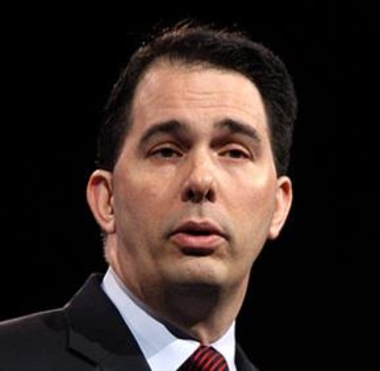Wisconsin: Walker largely silent on gay marriage, while AG threatens clerks

Madison, Wis. (AP) — Gov. Scott Walker has a history of forcefully opposing same-sex marriage in Wisconsin, but in the wake of the state's ban on gay marriages being found unconstitutional last Friday, the Republican leader said Thursday that his own views about the issue do not matter.
Walker, who is running for re-election this year and eyeing a bid for president in 2016, continued to largely duck questions about the state's ban he voted for in 2006, as hundreds of gay couples wed in the last week and polls show public attitudes shifting in favor of allowing same-sex marriages.
Walker campaigned strongly in support of the ban nine years ago. He now says his position is irrelevant, event though he admits voting for the ban. As a member of the state Assembly he voted for a bill in 1997 to prohibit same-sex marriages and declare those conducted in other states to be invalid. As Milwaukee County executive in 2009, Walker vetoed a measure to provide benefits to same-sex partners of county workers.
Walker's reluctance to stick to his hard-line position may be explained by recent polls showing growing public support for same-sex marriages. A Marquette University law school poll released in May found that 55 percent of registered Wisconsin voters favor allowing gays and lesbians to marry legally.
Sixty of Wisconsin's 72 county clerks had issued 555 marriage licenses to same-sex couples as of midday Thursday, based on a survey by The Associated Press.
Republican Attorney General J.B. Van Hollen said Thursday that those clerks risk being criminally charged by local district attorneys if they believe they are breaking the law by doing so. Van Hollen continues to ask both U.S. District Judge Barbara Crabb and a federal appeals court to put the ruling striking down the ban on hold while he appeals the case, a move that would force clerks to stop issuing licenses.
Van Hollen, a Republican, told the Milwaukee Journal Sentinel newspaper that gay couples who have married since Crabb issued her ruling last week aren't legally married and district attorneys could opt to charge county clerks who issued them licenses with a crime.
"That's going to be up to district attorneys, not me," Van Hollen said. "There are penalties within our marriage code, within our statues, and hopefully they're acting with full awareness of what's contained therein. ... You do have many people in Wisconsin basically taking the law into their own hands, and there can be legal repercussions for that."
Clerks began issuing licenses June 6, hours after Crabb's ruling came out. As of Thursday, 60 of the state's 72 counties were issuing licenses.
But confusion has swirled about what clerks can legally do. Crabb declared the ban unconstitutional but did not issue any orders telling clerks to issue licenses. Van Hollen maintains that without such an order the ban remains in place.
Crabb currently is considering a proposed order from the American Civil Liberties Union that calls for clerks to issue same-sex licenses, but she hasn't issued anything formal yet. Van Hollen, meanwhile, has asked both Crabb and the 7th Circuit Court of Appeals to halt the marriages pending an appeal of the constitutionality ruling.
Dane County, the most liberal county in the state, began issuing licenses within hours of Crabb's June 6 decision. Clerk Scott McDonell called Van Hollen's warning that prosecutors could charge clerks "ridiculous."
"There has to be (criminal) intent. If a reasonable person can read that the judge clearly invalidated the state ban on same-sex marriage, what would be the charge?" he said.
Janine Geske, a Marquette University law professor and a former Wisconsin Supreme Court justice, said charging county clerks would be impractical and expensive. For example, since district attorneys, clerks and judges in a county likely all know each other, district attorneys would have to call in special prosecutors and judges from outside the county to avoid an appearance of a conflict of interest, she said.
A conviction would be difficult to win since clerks could argue Crabb's decision is unclear and they're interpreting it as best they can, she said. It's not as if clerks are completely ignoring the basic requirements for marriage licenses, such as a birth certificate, she said.
Both Republican and Democratic clerks, in both Republican and Democratic-voting counties, are issuing the licenses.
___
Associated press reports by Scott Bauer and Todd Richmond, both of the Associated Press, were combined for this story.
Associated Press writer Carrie Antlfinger contributed to this report from Oak Creek, Wisconsin.
Copyright 2014 The Associated Press. All rights reserved. This material may not be published, broadcast, rewritten or redistributed.
The Gayly – June 12, 2014 @ 4:15pm





